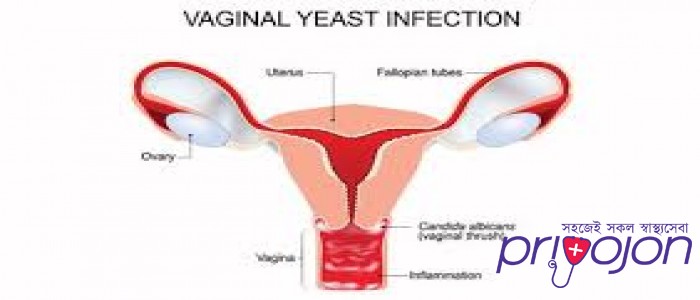
Overview
Medically reviewed by Dr. Rabeya Afroz Shomi
What is the treatment?
Vaginal yeast infection is basically a kind of fungal infection caused by a fungus called Candida. Almost 50% of all women have the fungus present in their vaginas. The fungus is not harmful usually and has a passive existence. It is when the normal balance between the bacteria and yeast is overturned that a yeast infection occurs. A vaginal yeast infection is very common and more than 75% of all women are affected by it once in their lifetime.
Topical treatment is often considered for vaginal yeast infection. There are creams that can be directly applied to the vagina and the infection is cured within 2-3 days. Periodic infections may require topical medication for a longer period of time. Oral medication can also be taken to cure vaginal yeast infection.
How is the treatment done?
Vaginal yeast infection can be treated quite easily. Antifungal ointments, creams and tablets are available in abundance. Women can opt for an antifungal course of 3 days or a week depending on the severity of the situation. Terconazole, Butoconazole, Clotrimazole are the medications that have proved to be the most effective. Doctors often prescribe a two or three-time dose of the antifungal oral medication called fluconazole. It is an extremely medication and cures fungal infection in a jiffy. Azole antifungal agents are widely used to treat severe yeast infection. Azole medication is available in the form of pill, vaginal ointment, cream or suppository. An azole medication regimen of a week or two can completely cure severe vaginal yeast infection. For periodic vaginal yeast infections, doctors prescribe a course of fluconazole pills to be consumed each week for 6 months. Some doctors may recommend the use of a clotrimazole suppository once a week for treating the same.
Who is eligible for the treatment? (When is the treatment done?)
All women suffering from yeast vaginitis are eligible to receive treatment for the same.
Who is not eligible for the treatment?
Vaginal yeast infections are very common and women can treat them with over-the-counter medication or antifungal medication present at home. But women who are pregnant must not follow this course of treatment. Pregnant women must consult their doctors before treating themselves for vaginal yeast infections.
Are there any side effects?
Women should use some alternative birth-control measure as antifungal suppositories or ointments are oily in texture and thus often end up weakening condoms and diaphragms. Oral antifungal medication may also cause headache, abdominal pain and nausea.
What are the post-treatment guidelines?
Women should keep their vaginas as clean and dry as possible to prevent further growth of yeast.
How long does it take to recover?
Vaginal yeast infection is a very common condition in women and gets cured very quickly. The maximum time taken for vaginal yeast infection to completely heal is a week or two. For recurrent yeast infections, doctors may prescribe an antifungal regimen of 6 months, but that does not hinder one's normal routine.
Are the results of the treatment permanent?
Vaginal yeast infection gets completely cured with antifungal medication. But like any other infection, it may return sometime later. But there's nothing to be worried about.
What are the alternatives to the treatment?
Instead of using standard antifungal medication, women can use boric acid suppositories to treat vaginal yeast infection. A regimen comprising one boric acid suppository each day at bedtime will completely cure yeast vaginitis.
